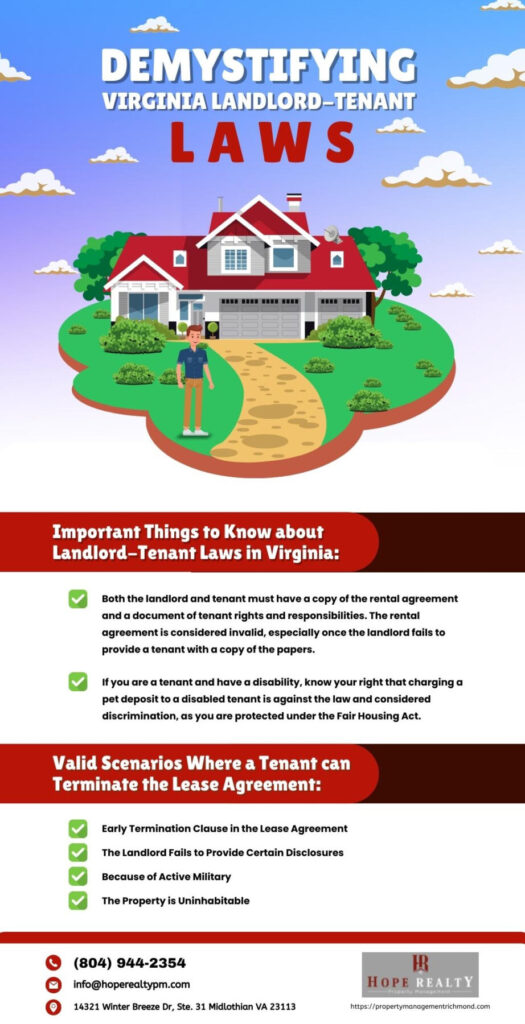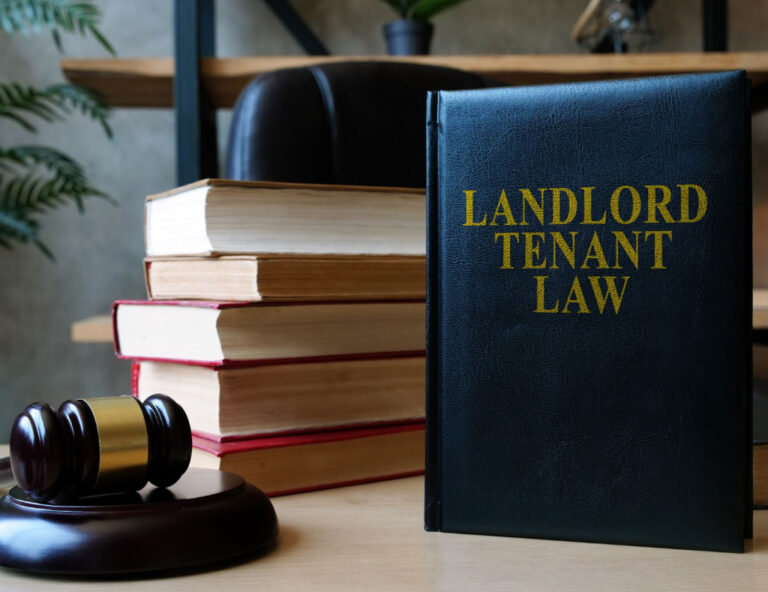Credit: Image by inboundREM | Source
Renting a home offers a sense of freedom for some by having a space to call home, but it comes with rights and obligations to consider for tenants and landlords.
In Virginia, where rental demand is strong, especially in urban areas, understanding Virginia landlord-tenant laws is not just beneficial; it is vital.
The Virginia Residential Landlord and Tenant Act (VRLTA), enacted in 1974, clearly outlines the rights and states the set of legal responsibilities of tenants and landlords.
Whether you are a landlord, tenant, or someone planning to rent in Virginia, we aim this blog to be your companion in understanding the laws and responsibilities of renting in Virginia.
Lease and Agreement Terms

Photo by Romain Dancre on Unsplash
Rental Agreements and Lease Terms
Virginia Residential Landlord and Tenant Act Chapter 12 Section 55.1-1204 states that the landlord must give the prospective tenant a written rental agreement.
The document explains all the terms for living in a rental home and the conditions of the landlord-tenant relationship.
The rental agreement term may include rent cost, fees for paying rent late, how long the agreement lasts, automatic renewal of the rental agreement, requirements for notice if you want to move out or terminate the contract, and other rights and rules of each party involved.
Along with this document, the landlord must also provide the statement of the rights and responsibilities of the tenant by the Department of Housing and Community Development.
Note❗ Both the landlord and tenant must have a copy of the rental agreement and a document of tenant rights and responsibilities. The rental agreement is considered invalid, especially once the landlord fails to provide a tenant with a copy of the papers.
The rental agreement will only be effective on the date the tenant and landlord signed. If a tenant fails to sign the form, the landlord will record the date(s) on which he provided the form and evidence that the tenant didn’t sign such form.
On the other hand, if a landlord doesn’t give a written agreement, the rules stated in Virginia Law Section 55.1-1204 will be automatically set by the law.
In a Virginia lease agreement, the landlord should not charge a tenant for late rent payment unless provided in the written rental agreement. If it is included in the terms and conditions, the charge should not exceed 10% of the usual rent amount or the rent the tenant owes.
Lease Modifications and Addendums
The lease addendum is a document you attach to the original rental agreement. Instead of writing everything again, you can write down the new terms and conditions you want to change or add.
It is like adding a little extra piece of paper to explain the changes in the lease agreement, addressing the specific issues, or adding supplemental terms.
The document can include rent adjustments, lease term extensions or reductions, alterations to utility responsibilities, or any other mutually agreed-upon changes.
The lease addendum by the Northern Virginia Association of Realtors provides an example of the lease addendum form.
If changes in the rental agreement are needed, remember that both the landlord and the tenant must agree and follow the terms of the rental agreement or the law.
Subleasing
Subleasing is when the tenant lets someone else live on the property while maintaining the lease for a specific time. If there’s a policy against subletting upon checking the original agreement, you must notify the landlord and then wait for approval.
After receiving permission, you can create a sublease arrangement and ensure both parties agree on the terms and sign.
Sometimes, the landlord might not agree to this because you haven’t paid rent on time before, didn’t take care of the home, your rental history isn’t good due to lease violations, or the landlord wants to increase the rent because of the extra person.
When the rent is about to end, you, the original tenant, must tell the subtenant about renewing the lease agreement or if you are leaving the property, as the subtenant can’t renew the agreement alone.
Tenants Responsibilities

Photo by Annika Wischnewsky on Unsplash
Landlords may require tenants to have and pay for renter’s insurance. A tenant may also be required to have and pay for a security deposit or damage insurance. Still, the total of both the damage insurance premiums and the security deposit must be at most two months’ rent.
If the tenant is not required to have renter’s insurance as per the rental agreement, the landlord has to provide a written notice to the tenant before they both agree on the rental.
The notice should indicate that the landlord isn’t responsible if the tenant’s personal property gets damaged, the landlord’s insurance doesn’t pay for the tenant’s property, and if the tenant wants to keep their property safe, they should get renter’s insurance.
If the rental contract requires the tenant to notify the landlord regarding an anticipated absence for more than a week, yet the tenant doesn’t do that, the landlord can ask the tenant to pay for any damages.
During the absence of a tenant for more than seven days, the landlord may enter the rental unit to protect their property.
If the landlord cannot determine if the tenant has abandoned the property, landlords should give a written notice to tenants to ask if the tenant is still staying.
If the landlord doesn’t hear from the tenant and can’t confirm if they are still staying in the property after a week of notice, assuming that the tenant has abandoned the property is justified. The lease agreement is terminated as of the date of abandonment by the tenant.
Tenant Rights and Protections

Photo by Signature Pro on Unsplash
Tenant Privacy
Following Section 55.1-1209, Chapter 12 of the Virginia Residential Landlord and Tenant Act, a landlord should not release information about a tenant or prospective tenant without their written consent, except if the information is already a public record or is requested under certain circumstances.
Early Termination of Lease
Similar to other states, tenants in Virginia can terminate their lease legally without facing any termination fee. The following are example scenarios where a tenant can terminate the lease:
Early Termination Clause in the Lease Agreement
The landlord can approve the termination of the lease through an early termination clause.
It addresses terms such as requiring the tenant to provide advance written notice at least 30 days before moving out, pay a penalty fee of one to two months’ rent, and clear all utility bills and other charges before leaving the rental unit.
The Landlord Fails to Provide Certain Disclosures
If the landlord fails to provide the tenant with disclosure about defective drywall, property used to manufacture methamphetamine, or whether the property is located near a military air installation, the tenant’s request for early lease termination is justified, and the landlord may face fines.
In Virginia, members of the Armed Forces of the United States or the National Guard serving on full-time duty or as civil service technicians can end their lease early under certain circumstances, which include the following:
- Receiving permanent change of station orders to move 35 miles or more away.
- Getting temporary duty orders for over three months to move 35 miles or more away.
- Being discharged or released from active duty with the Armed Forces of the United States or from full-time duty or technician status with the National Guard.
- They are ordered to report to government-supplied quarters, which means they lose their basic allowance for quarters.
The military personnel must give the landlord a written notice of termination and furnish a copy of the official orders.
The date must be at least 30 days after the next rent payment is due and should not be more than 60 days before the required departure date based on official orders or extra instructions for training or duty before moving.
During the first move, tenants can cancel the rental agreement early if the tenant notices problems that could cause a fire or danger to health or safety, like pests, lack of heat, water, electricity, or sewage problems.
If the landlord disagrees, they must tell the tenant why within 15 business days. However, if the tenant insists on terminating the lease due to the uninhabitable property, they can take the landlord to court to settle the disagreement.
Tenants must provide written notice within a week from when they were supposed to move in or out. There’s also a chance that they will give you back all the money you paid them, including deposits and rent.
Suppose there’s a problem in the rental dwelling unit affecting health, safety, or overall habitability, and the landlord does not address it within 14 days after the tenant’s written notice. The tenant can bring it to court or hire a licensed contractor to address the issue.
The cost should be under $1,500 or less than what they pay for one month of rent. Tenants can also decide to pay for the repair and ask to deduct it from their next rent payment.
The tenant must send the landlord an itemized invoice and a payment receipt to the contractor, along with the payment of the remaining rent owed.
In Virginia landlord-tenant laws, the landlord can’t ask the tenant for more than two months’ rent as a security deposit.
Once the tenant’s rental period ends, this security deposit can be used by a landlord to cover unpaid rent and utility bills and pay for damages caused by the tenant that go beyond regular wear and tear.
Landlords can also use the security deposit for other charges provided in the rental agreement or as compensation for a breach of the lease agreement.
Landlords can also charge additional security deposits aside from the rent deposit, which should be reasonable.
For instance, the pet deposit typically ranges from $200 to $500. If you are a tenant and have a disability, know your right that charging a pet deposit to a disabled tenant is against the law and considered discrimination, as you are protected under the Fair Housing Act.
Furthermore, if you want to stop renting before the lease agreement ends, you might have to pay the landlord for any extra fees.
Regarding returning the security deposit, the landlord must list the deductions, damages, and charges in a written notice and the amount due to the tenant. These should be given to the tenant within 45 days after the last day of the lease or when the tenant moves out.
According to the Retaliatory conduct prohibited by the Virginia Residential Landlord and Tenant Act, if the tenant complains to a government agency about the rental property’s safety and health hazard, takes legal action against the landlord, or joins a tenant’s organization, the landlord cannot retaliate by increasing tenant’s rent, reducing services, and evict the tenant just because of the said situations.
Suppose the landlord tries to retaliate against the tenant for complaining or taking action. In that case, the tenants can ask for compensation for any harm they’ve suffered and use the landlord’s retaliation to defend themselves if they try to evict them.
But keep in mind that tenants need to prove the landlord’s retaliation, and landlords can still end the lease agreement if they have valid reasons not about retaliation.
For example, there are some situations where a landlord can end the tenant’s rental agreement even if the tenant complained or took action because the tenant or guests have caused problems that violate safety rules, have unpaid rent, or if the property needs significant repairs that would make it unlivable.
Landlord Responsibilities

Photo by Van Tay Media on Unsplash
The landlord can’t terminate the tenant’s lease agreement unless there’s an early termination clause on the lease agreement, and it was proven that the tenant has violated the agreement.
If the landlord terminates the agreement, he must provide written notice to the tenant for at least 30 days, unless a different notice period is stated on the rental agreement, or file an eviction lawsuit.
If the tenant still occupies the rental unit without the landlord agreeing, they can legally take action to make the tenant leave. The landlord can ask the tenant to pay for any damages caused, lawyer fees, and court costs.
But, if the tenant proves reasonable for their stay, there’s a chance they will not pay those extra costs. The landlord can also mention the cost if the tenant stays even after the rental agreement ends. The additional payment can’t be more than 150% of the daily rate of monthly rent.
Landlords in Virginia must follow the building and housing codes affecting health and safety and, therefore, be responsible for addressing the maintenance and repairs needed to keep the property fit and habitable.
Unit owners must also ensure electrical, sanitary, heating, plumbing, air-conditioning, ventilating, and other facilities and appliances, including elevators, are all safe and working.
Landlords must also ensure that the property has water that works constantly. They also need to provide air conditioning and heat during specific times of the year.
Landlord Rights

Photo by NordWood Themes on Unsplash
Tenant Screening Criteria
Tenant screening helps landlords check the prospective tenant’s rental payment records, eviction history, fraud reports, and credit and background checks to ensure they will get a trustworthy tenant and avoid problems.
When creating tenant screening criteria, ensure it follows the Virginia Fair Housing Laws’ Unlawful Discriminatory Housing Practices.
Virginia allows landlords to enter a tenant’s home to do the following as long as they give the tenant a 24-hour notice:
- Inspect the property
- Make necessary or agreed-upon repairs, alterations, or decorations
- Provide services
- Show the property to potential buyers, mortgagees, tenants, or contractors
The landlord can also enter the property without the tenant’s consent in case of emergency, and the landlord should not abuse it or use it to harass the tenant.
According to landlord-tenant laws in Virginia, a landlord with more than four rental units must provide written notice of rent increase during the lease at least 60 days before the end of the rental agreement.
How much can landlords increase rent in Virginia? Unfortunately, Virginia has no rent stabilization laws, so there’s no actual amount on how a landlord can raise the rent.
Still, there are situations where rent increase is illegal, such as discrimination, retaliation, landlord’s breach of contract, and if the rent is too high compared to the average rent in similar properties in the neighborhood.

Final Thoughts
Virginia landlord-tenant laws establish the rights and interest of both landlords and tenants and help provide clear guidelines to ensure rental terms and agreement adheres to legal standards.
Moreover, knowing Virginia landlord-tenant laws will give you a clear understanding of your legal rights and obligations to comply as a landlord or tenant.
It will help you avoid misunderstandings and disputes that may lead to time-consuming lawsuits and potentially affect your finances.
Remember that ignorance of the law excuses no one, so you must know your responsibilities and rights as a tenant and landlord in Virginia.
For clarification or questions about laws regarding landlords and tenants in Virginia, please do not hesitate to contact us at (804) 944-2354 or info@hoperealtypm.com. Our team will gladly assist you with any inquiry you may have.
To connect with us more conveniently, we encourage you to follow us on our social media channels below:

Photo by STEPHEN POORE on Unsplash
Frequently Asked Questions
What's the maximum security deposit a landlord can charge?
The landlord can only charge an amount that will not exceed the tenant’s two-month rent. So, if your rent is $842, the landlord can only charge you a maximum of $1,684 for a security deposit.
Can a landlord evict a tenant without a court order?
Under Virginia law, the landlord cannot evict a tenant without giving notice and going to court. For such situations, the landlord must first give the tenant notice and possibly a chance to settle the problem before terminating the rent agreement and filing an eviction lawsuit.
Can a landlord increase rent mid-lease?
Landlords cannot increase rent in the middle of a lease term unless there’s a stated clause in the lease agreement or the agreement is up for renewal. The landlord must also give a 30-day notice about the rent increase.
Can a tenant withhold rent for minor repairs?
No, instead, tenants must notify the landlord about property problems that require repairs.
Suppose you have given the landlord a notice for repairs but do not respond. In that case, you can have it repaired by the contractor and ask to deduct it from your next rent payment, given that you provide the landlord with an itemized invoice and a payment receipt to the contractor.
You can also take it to the court if necessary.




